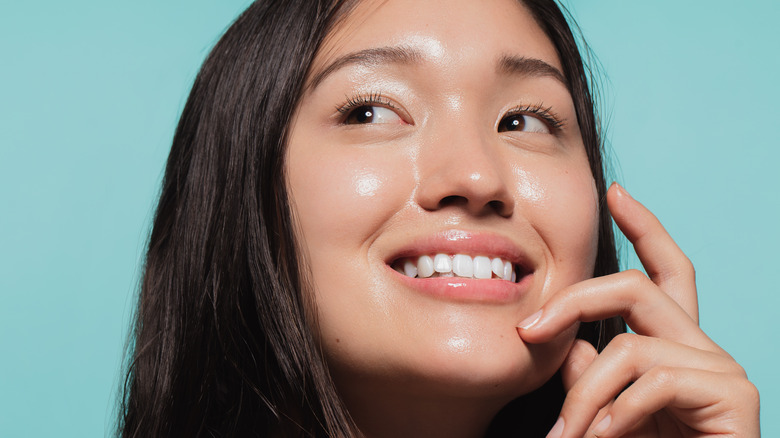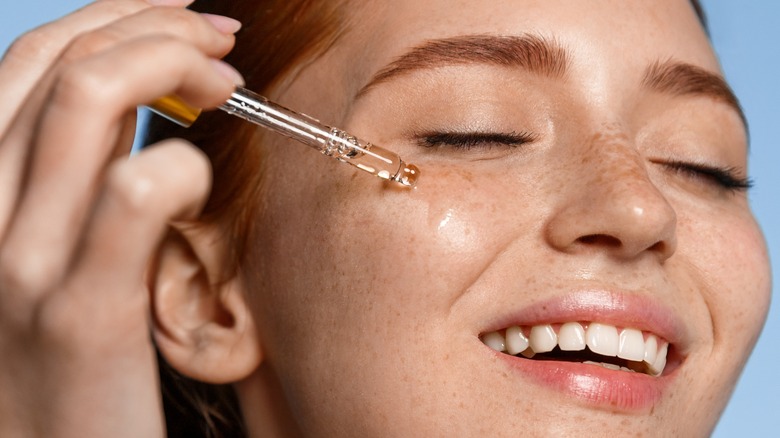How To Make Your Skin Glow According To Science
We may receive a commission on purchases made from links.
Nowadays, you can find hundreds of makeup products in beauty aisles to make your skin glow. Anything from highlighter to foundations and tinted moisturizers with light-reflecting particles can give you radiant-looking skin. While you can choose makeup products that help your skin look more luminous and dewy, you need to start by taking care of your skin first. Healthy skin has a natural glow about it, and factors such as sleep deprivation and stress can make it look dull (via Good Housekeeping). Before you lose hope about not being able to get eight hours of sleep every night (though it does immensely help your skin recover and rejuvenate), you can make some lifestyle changes as well.
Depending on the time of year, your skin might be more dry, oily, or irritated, but making positive changes can turn the tables around. Dr. Tina Funt of Schweiger Dermatology Group told Dermstore, "Glowing skin is skin that is moist and soft — not dull, dry or flaky." She added a skin that truly glows has "small pores, even complexion and clear skin without blemishes." It might sound impossible but trying these science-backed tips can add extra radiance to your skin and make you really glow all year round.
Add vitamin C for a brighter complexion
Vitamin C is one of the most popular ingredients in the world of skincare for its numerous benefits, and one of them is that it literally makes your skin glow. A study published in the National Library of Medicine showed that vitamin C could reduce the production of melanin, which is responsible for giving your skin its color. However, overproduction can also cause dark spots and hyperpigmentation. Good Housekeeping Beauty Lab Chemist Danusia Wnek agrees with the skin-brightening benefits of vitamin C and told Good Housekeeping, "[Vitamin C is] an antioxidant that brightens skin by blocking an enzyme that produces pigment." While we have to thank melanin for giving everyone their beautiful color, we definitely don't want it to give us extra dark spots and dullness.
According to Healthline, vitamin C's skin benefits include lightening the dark spots and making your skin look more even, giving you a "youthful glow." We have science to prove it, so keep using your vitamin C serums every day. If you don't have one yet, you should definitely invest in one for your vanity. Plus, using it under your sunscreen — which you should never skip — can give you extra "protection from free radicals" (via mindbodygreen).
You need vitamin A for a serious glow
According to Healthline, retinoids are a form of vitamin A that help our skin. Retinol, which is a retinoid, is one of the most well-known anti-aging ingredients. If you want a serious glow, Well+Good considers retinol "the MVP." Cara Peloso, a facialist at New York City's CAP Beauty, told the outlet, "Retinol addresses anti-aging concerns like wrinkles, uneven skin tone, and dryness." She added that it also prevents "breakouts, clogged pores, and post-inflammatory pigmentation from blemishes that are healing." It seems retinol can take care of almost all the skin issues that might affect your skin's ability to glow. Retinol also has the power to increase cell renewal and brings healthy, new cells to the surface, making you look more youthful than before.
A study published in the National Library of Medicine showed that people who used tretinoin, another retinoid, had a "rosy glow" compared to the group who didn't. Even after they stopped using it, their skin kept improving. Now, that's impressive. Adding a retinol serum to your nighttime routine can help improve the quality of your skin, and you can get it over the counter. However, if you are interested in using tretinoin, you must see a dermatologist to get the prescription.
Load up on fruits and veggies
Skincare products help improve the quality of your skin, but it is also essential to eat healthy foods to nourish your skin inside out. Dr. Jessica Wu, M.D., a Los Angeles dermatologist, told Eat This, Not That!, "There's a growing body of research showing that the food you eat can affect your complexion." She added that digested food gets into your bloodstream and provides nutrients to your skin. For example, tomatoes can help clear your skin and make you glow because they have this ingredient called lycopene that helps increase collagen production and protects your skin from free radicals. Similarly, blueberries are a great source of antioxidants because they have anthocyanins that also help fight free radicals, according to Dr. Rachael Burns, a dermatologist with Sönd. Even Dr. Tina Funt told Dermstore, "Antioxidants are also great ingredients for a glowing complexion." Hence, now you know that fruits and vegetables give you a healthy body and better-looking skin.
Medical News Today shared that adding fruits and vegetables like citrus fruits and broccoli can strengthen your skin barrier, protect your skin against sun damage (though you still need sunscreen), and help reduce the possibility of skin diseases. Adding them to your diet is one step closer to healthier skin, which can glow.
Drink water for healthy and hydrated skin
While we might use skincare products to make our skin look good from the outside, it is essential to note that taking care of your skin begins from within. Joshua Zeichner, a board-certified dermatologist, told Byrdie, "If you are severely dehydrated, it will take a toll on your skin." Plus, it is good to drink water. Dr. Tina Funt believes it is crucial to stay hydrated because it helps your overall health, including your skin, per Dermstore.
Most of us know the importance of drinking eight glasses of water a day, but all of us don't follow it. According to Skin Kraft, water is an integral part of your skin barrier, and if you do not have enough water to support it, your skin has more possibility of getting damaged. They recommend drinking plenty of water, not just to make your skin glow but to also keep it "soft and supple."
Sleep is key to glowing skin
We don't nearly get enough sleep we need, and while we might be able to function in our day-to-day life being sleep-deprived, it is not doing our skin any favors. According to WebMD, the blood flow increases while we sleep. So, if you aren't sleeping enough, your skin can look "drab, ashen, and lifeless." Dr. Michael Breus, Ph.D., a sleep specialist, told the outlet, "Skin becomes dull, and you don't get those rosy cheeks anymore," if you don't get enough sleep. Dermatologist Patricia Wexler, MD recommends at least seven hours a night. No wonder it is called beauty sleep.
Francesca Fusco, MD, a dermatologist and assistant clinical professor of dermatology at Mount Sinai, told Everyday Health, "Our skin rests and repairs itself while we sleep," because while we sleep, our skin is not exposed to UV rays or facial movements. When our skin is in "repair and restore mode," it also gets rid of toxins and makes new cells while getting rid of old ones. When we wake up, our skin looks and feels "fresher, younger, and more radiant."





